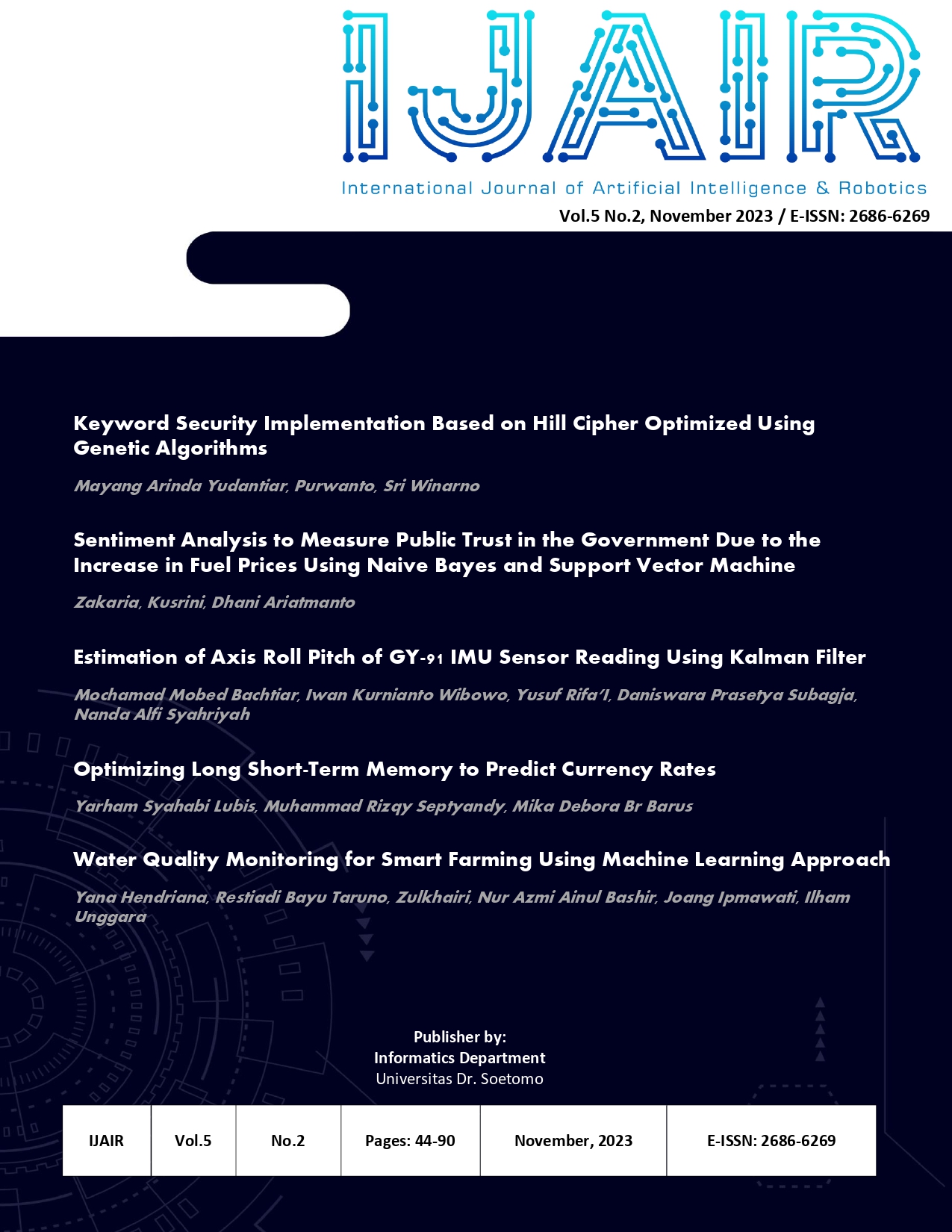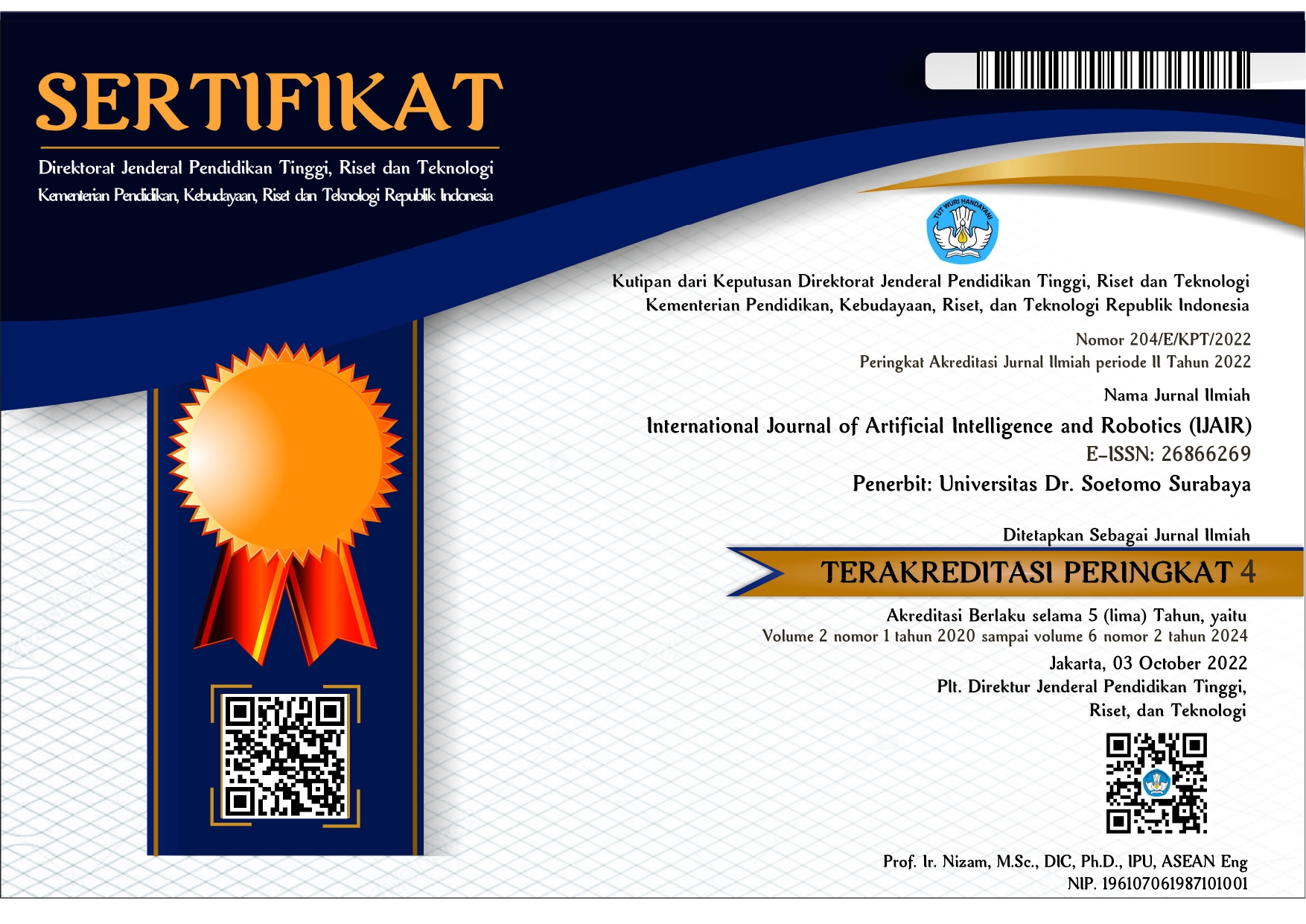Sentiment Analysis to Measure Public Trust in the Government Due to the Increase in Fuel Prices Using Naive Bayes and Support Vector Machine
 Abstract views: 403
,
Abstract views: 403
,
 PDF downloads: 304
PDF downloads: 304
Abstract
The study examines public sentiment on the government's fuel price policy using an experimental approach and Twitter data obtained through API scraping. It applies sentiment analysis methods like Naïve Bayes, SVM, and Majority Voting. SVM achieved 85% accuracy, excelling in identifying negative sentiments, while Majority Voting reached 70% by considering confidence levels. Naïve Bayes struggled with neutral sentiments. They are combining methods to enhance the understanding of public sentiments on fuel price changes. The study highlights sentiment analysis' effectiveness in gauging reactions to fuel policies, with SVM offering more profound insights into sentiments related to fuel price hikes. Challenges remain in identifying neutral sentiments due to social media text brevity. These findings underscore the contextual importance of interpreting sentiment analysis. Leveraging these insights, governments can understand public perceptions better and devise improved communication strategies for sensitive economic policies like fuel price hikes, fostering better government-citizen interactions. The study aims to guide stakeholders in comprehending public perspectives within public policy, emphasizing the relevance of sentiment analysis for policy evaluation.
Downloads
References
G. Rozy Hrp, N. Aslami, and P. Studi Manajemen Fakultas Ekonomi Bisnis Islam, “Analisis Damfak Kebijakan Perubahan Publik Harga BBM terhadap Perekonomian Rakyat Indonesia,†Jurnal Ilmu Komputer, Ekonomi dan Manajemen , vol. 2, no. 1, pp. 1464–1474, 2022.
D. Kompensasi Kenaikan Harga Bahan Bakar Minyak Terhadap, D. Lauradina, and A. Murwiati, “Pengeluaran Rumah Tangga Miskin Dengan Metode Difference in Difference (Studi Kasus: Kecamatan Panjang Kota Bandar Lampung)â€.
T. D. Arista, M. Fikry, L. Oktavia, U. Islam, N. Sultan, and S. Kasim, “Klasifikasi Sentimen Masyarakat di Twitter terhadap Kenaikan Harga BBM dengan Metode K-NN,†vol. 5, pp. 140–150, 2023.
A. Tanza, R. P. Maulidya, T. P. Junita, and E. Widodo, “Analisis Pengaruh Kenaikan Harga BBM Terhadap Pergerakan Saham Sektor Transportasi dan Logistik,†Dialektika : Jurnal Ekonomi dan Ilmu Sosial, vol. 8, no. 1, pp. 52–62, 2023, doi: 10.36636/dialektika.v8i1.2044.
W. Wardani, S. Suriana, S. U. Arfah, Z. Zulaili, and P. S. Lubis, “Dampak kenaikan Bahan Bakar Minyak (BBM) Terhadap Inflasi dan Implikasinya Terhadap Makroekonomi di Indonesia,†All Fields of Science Journal Liaison Academia and Sosiety, vol. 2, no. 3, pp. 63–70, 2022, doi: 10.58939/afosj-las.v2i3.338.
M. I. Al Islami, Q. Mauluudin, S. D. Claritsa, E. Permana, and R. Amyulianthy, “Pengaruh Harga Bbm Terhadap Daya Beli Masyarakat di Indonesia, Malaysia dan Singapura,†Jurnal Ilmu Komputer dan Bisnis, vol. 14, no. 1, pp. 180–187, May 2023, doi: 10.47927/jikb.v14i1.451.
R. Harun, R. Ishak, and S. S. Panna, “Analisis Sentimen Opini Publik Pengguna Twitter Terhadap Kenaikan Harga BBM Menggunakan Algoritma Naïve Bayes,†Copyright @BALOK, vol. 2, no. 1, 2023.
Sarbaini and Nazaruddin, “Pengaruh Kenaikan BBM Terhadap Laju Inflasi di Indonesia,†Jurnal Teknologi dan Manajemen Industri Terapan (JTMIT), vol. 2, no. 1, pp. 25–32, 2023.
B. F. R. Al Fajrin, A. Z. Jinan, P. S. Auliyah, A. F. Wulandari, and N. Tambunan, "The Impact of the Drastic Increase in Fuel Oil (Bbm) Prices," Journal of Social Research, vol. 2, no. 3, pp. 640–645, 2023, doi: 10.55324/josr.v2i3.709.
F. Sahid and R. R. Fauzy, “Dampak Kenaikan Harga BBM terhadap RBP di Kontraktor X Karena Kelangkaan BBM di Pandemik Covid-19,†J-MAS (Jurnal Manajemen dan Sains), vol. 8, no. 2, p. 1298, Oct. 2023, doi: 10.33087/jmas.v8i2.1186.
S. Rukaiyah, “ANALISIS MANAJEMEN STRATEGI DALAM MENGHADAPI DAMPAK KENAIKAN BBM (STUDI KASUS NELAYAN DI KAB. MERAUKE),†POMA JURNAL : PUBLISH OF MANAGEMENT, vol. 1, pp. 70–83, 2023.
I. Karamitsos, S. Albarhami, and C. Apostolopoulos, "Tweet Sentiment Analysis (TSA) for Cloud Providers Using Classification Algorithms and Latent Semantic Analysis," Journal of Data Analysis and Information Processing, vol. 07, no. 04, pp. 276–294, 2019, doi: 10.4236/jdaip.2019.74016.
M. R. Nurhusen, J. Indra, and ..., “Analisis Sentimen Pengguna Twitter Terhadap Kenaikan Harga Bahan Bakar Minyak (BBM) Menggunakan Metode Logistic Regression,†Jurnal Media …, vol. 7, pp. 276–282, 2023, doi: 10.30865/mib.v7i1.5491.
E. A. Sukma, A. N. Hidayanto, A. I. Pandesenda, A. N. Yahya, P. Widharto, and U. Rahardja, "Sentiment Analysis of the New Indonesian Government Policy (Omnibus Law) on Social Media Twitter," Proceedings - 2nd International Conference on Informatics, Multimedia, Cyber, and Information System, ICIMCIS 2020, no. July 2017, pp. 153–158, 2020, doi: 10.1109/ICIMCIS51567.2020.9354287.
A. Pratama, R. I. Alhaqq, and Y. Ruldeviyani, "Sentiment Analysis of the Covid-19 Booster Vaccination Program As a Requirement for Homecoming During Eid Fitr in Indonesia," J Theor Appl Inf Technol, vol. 101, no. 1, pp. 248–261, 2023.
K. W. Lestari and T. Coan, "Evaluating Jokowi's Policy on Alcoholic Drink Investment in Indonesia by using sentiment analysis," Journal of Advanced Research in Social Sciences, vol. 5, no. 1, pp. 35–45, 2022, doi: 10.33422/jarss.v5i1.634.
L. Yue, W. Chen, X. Li, W. Zuo, and M. Yin, "A survey of sentiment analysis in social media," Knowl Inf Syst, vol. 60, no. 2, pp. 617–663, 2019, doi: 10.1007/s10115-018-1236-4.
A. Kukkar, R. Mohana, A. Sharma, A. Nayyar, and M. A. Shah, "Improving Sentiment Analysis in Social Media by Handling Lengthened Words," IEEE Access, vol. 11, no. January, pp. 9775–9788, 2023, doi: 10.1109/ACCESS.2023.3238366.
P. Zola, P. Cortez, C. Ragno, and E. Brentari, Social Media Cross-Source and Cross-Domain Sentiment Classification, vol. 18, no. 5. 2019. doi: 10.1142/S0219622019500305.
A. Khudhair, A. Khalil, H. A. Hussein, Q. Mohammed, and S. Alaa, "TWITTER SENTIMENT ANALYSIS USING AN ENSEMBLE MAJORITY VOTE CLASSIFIER," vol. 55, no. 1, pp. 1–7, 2020.
F. Handayani and S. Pribadi, “Implementasi Algoritma Naive Bayes Classifier dalam Pengklasifikasian Teks Otomatis Pengaduan dan Pelaporan Masyarakat melalui Layanan Call Center 110,†Jurnal Teknik Elektro, vol. 7, no. 1, pp. 19–24, 2015.
C. Troussas, A. Krouska, and M. Virvou, "Evaluation of ensemble-based sentiment classifiers for Twitter data," IISA 2016 - 7th International Conference on Information, Intelligence, Systems and Applications, 2016, doi: 10.1109/IISA.2016.7785380.
I. M. A. Agastya, “Pengaruh Stemmer Bahasa Indonesia Terhadap Peforma Analisis Sentimen Terjemahan Ulasan Film,†Jurnal Tekno Kompak, vol. 12, no. 1, p. 18, 2018, doi: 10.33365/jtk.v12i1.70.
Copyright (c) 2023 Zakaria Zakaria, Kusrini Kusrini, Dhani Ariatmanto

This work is licensed under a Creative Commons Attribution-ShareAlike 4.0 International License.
Authors who publish with International Journal of Artificial Intelligence & Robotics (IJAIR) agree to the following terms:
-
Authors retain copyright and grant the journal right of first publication with the work simultaneously licensed under a Creative Commons Attribution License (CC BY-SA 4.0) that allows others to share the work with an acknowledgment of the work's authorship and initial publication in this journal.
-
Authors are able to enter into separate, additional contractual arrangements for the non-exclusive distribution of the journal's published version of the work (e.g., post it to an institutional repository or publish it in a book), with an acknowledgment of its initial publication in this journal.
-
Authors are permitted and encouraged to post their work online (e.g., in institutional repositories or on their website) prior to and during the submission process, as it can lead to productive exchanges, as well as earlier and greater citation of published work.















